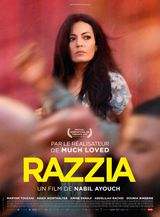“Razzia” is a multifaceted film that powerfully depicts the complexity of Morocco today. Like a mirror, it reflects 5 stories, 5 journeys, 5 personalities (including actors among whom Maryam Touzani stands out), 5 destinies unknowingly interconnected.
The five destinies of the main characters serve as a sort of anatomical cut of contemporary Moroccan society, five archetypes revealing different faces, different trajectories, different struggles, but a common quest for freedom.
Three years after “Much Loved,” filmmaker Nabil Ayouch returns with “Razzia,” a feature film co-written with screenwriter and star of the film, Maryam Touzani. He provides a new portrayal of Morocco, following the violence of censorship that his previous film faced.
The committed filmmaker reconnects with the desire to tell his country’s story, offering a lucid and eloquent look at Moroccan society.
The starting point of this new feature is the year 1982, set against the magnificent backdrop of the Atlas Mountains, where we meet Abdallah, a teacher who listens to his students in an isolated village. A well-respected man whose fate takes a turn when an inspector arrives to enforce new state doctrines, namely: imposing the Arabic language in education, despite the fact that students only understand the Berber dialect. These reforms are an early sign and turning point of Morocco’s shift towards Salafism, resulting in Abdallah’s forced escape, deeply wounded, and obstinately refusing to teach this strict reform of Islamic education common to three Maghreb countries (Tunisia, Algeria, and Morocco). “To leave and live free, to stay and fight… but fight against what?” we hear in a voiceover, encapsulating the film’s entire dilemma.
The feature then shifts directly to 2015, leading us into the streets of a large city, where we follow the beautiful Salima in a short dress and loose hair as she crosses the city to bathe in the Atlantic Ocean, while a violent protest unfolds against the reform of the inheritance law, where women rise with banners stating, “No, we do not want equality in inheritance.”
A wave of censorship and events clash with the desire for emancipation among a certain youth connected through modern technology (mobile phones, the internet, satellite TV channels) to the Western world and all its representations. Between ancestral tradition, linguistic conditioning, and the desire for freedom, the stage is set for a sociological study and a daily struggle in a country constantly under tension.
This rich narrative allows for multiplying perspectives and offering a lucid portrait and a worrying finding, but without overlooking the zest for life and hope deeply rooted in the hearts of all the characters in the story to break free from constraints and finally live according to their own desires.
In a country where censorship pervades everything, where the notion of imagination and identity is artificial, the author plunges us into turmoil in Casablanca, making us hopeful that after the night, “from chaos, stars are born,” during a moving final sequence.
A courageous and salutary feature film rich in questioning (the issue of education in Morocco, sexism, violence against women, homophobia, lack of individual freedoms, or anti-Semitism). An admirable response to intolerance.


